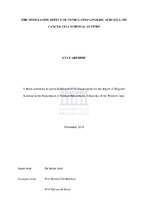| dc.contributor.advisor | Gelderblom, Wentzel | |
| dc.contributor.advisor | De Kock, Maryna | |
| dc.contributor.advisor | Abel, Stefan | |
| dc.contributor.author | Arendse, Lyle | |
| dc.date.accessioned | 2015-11-25T14:33:18Z | |
| dc.date.available | 2015-11-25T14:33:18Z | |
| dc.date.issued | 2014 | |
| dc.identifier.uri | http://hdl.handle.net/11394/4665 | |
| dc.description | Magister Scientiae (Medical Bioscience) - MSc(MBS) | en_US |
| dc.description.abstract | Conjugated linoleic acids (CLA) are geometrical and positional isomers of n-6 octadecadenoic acid (linoleic acid, LA, 18:2n-6), which form part of a family of essential polyunsaturated fatty acids (PUFA). There are 28 identified CLA isomers that mostly found in the meat and milk from ruminant animals. CLA has shown to possess a number of health benefits including; reduction in body fat and increased lean body mass, prevention of atherosclerosis, hypertension, increased immune function and in particular the prevention of cancer. The effects of CLA on cancer cell lines will be evaluated to discover the mechanisms that are employed to achieve this great phenomenon on cell growth. The aim of this study was to determine the effect of CLA on various parameters that are essential in the development of cancer cell phenotype. The objectives were to evaluate the effect of CLA on iron-induced lipid peroxidation of microsomes isolated from rat liver cells and in vitro cytotoxicity, cell proliferation and apoptosis in HepG2 hepatocarcinoma cells. The Fatty acid incorporation in HepG2 cells was also assessed. | en_US |
| dc.language.iso | en | en_US |
| dc.publisher | University of the Western Cape | en_US |
| dc.subject | Conjugated linoleic acid | en_US |
| dc.subject | Cancer | en_US |
| dc.subject | Lipid peroxidation | en_US |
| dc.subject | Cell cycle | en_US |
| dc.title | The modulating effect of conjugated linoleic acid (CLA) on cancer cell survival in vitro | en_US |
| dc.type | Thesis | en_US |
| dc.rights.holder | University of the Western Cape | en_US |

